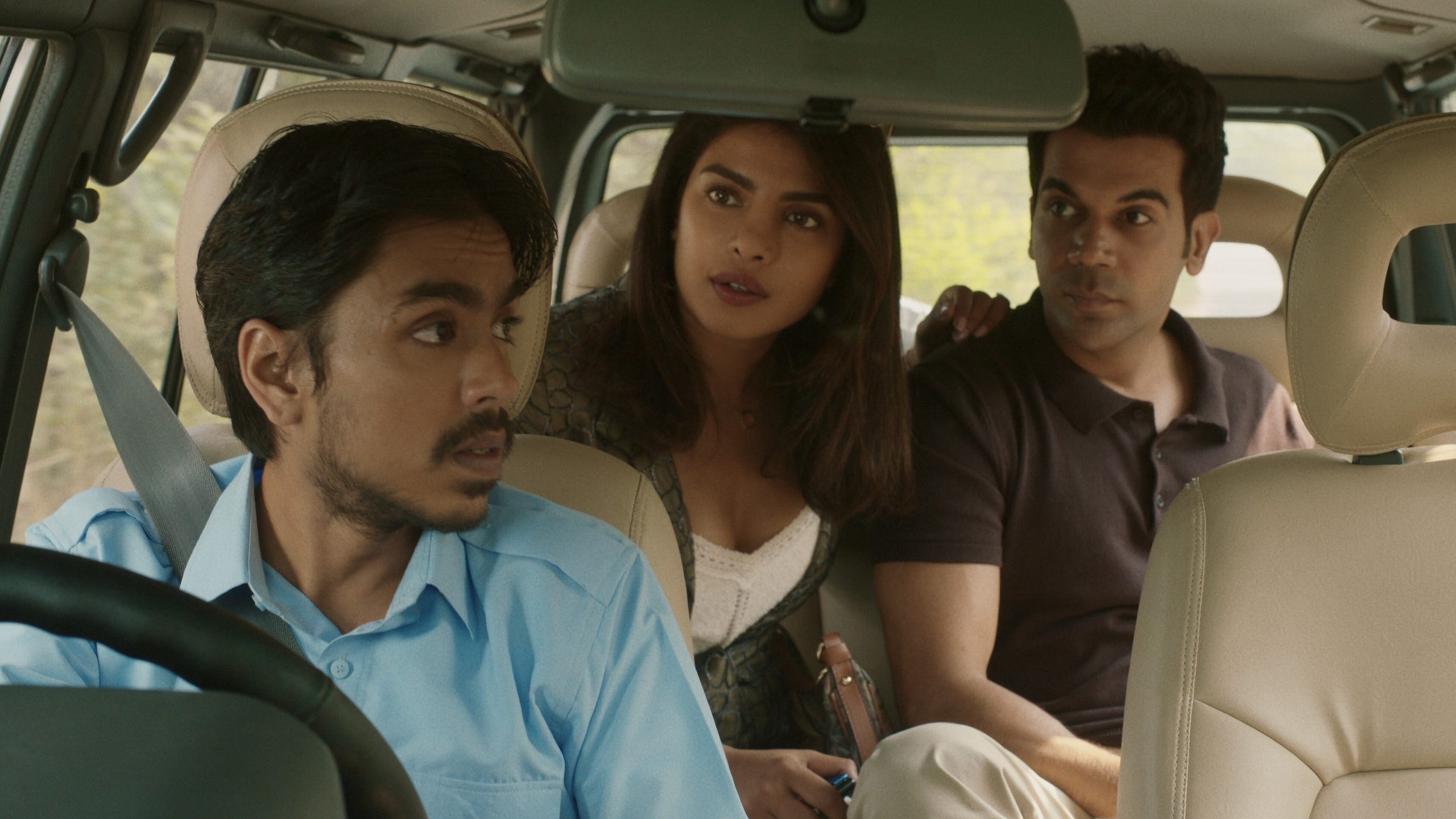
Caste out
Ramin Bahrani has long since passed into the subset of directors whose best work, I concede, is almost certainly behind them, while my regard for that best work remains so high that I will continue to regard every one of their new films as an event of at least minor importance. And "minor importance" is exactly the term I'd choose to describe The White Tiger, Bahrani's seventh feature-length film, and among the most polished of his career, though thankfully he's managed the uncommon feat of making it all the way through creating a Netflix original production without it getting pulverised in the meat grinder of ugly digital cinematography. For which we presumably ought to credit cinematographer Paolo Carnera, who has threaded an impressively fine needle: making different parts of India, mostly the city of New Delhi, look realistically unromantic, while avoiding the temptation to just coat in all the raw squalor of urban poverty. Given that most films set in Indian cities go straight to one of the extremes of "festive exotic colors" or "stomach-churning ugly realism", this is already an achievement.
But then, the whole thing Bahrani's films have always been good at is making places feel like themselves, not like exaggerated concepts of themselves (his 2005 debut Man Push Cart remains possibly my favorite screen depiction of New York in the 21st Century), and while his gaze has so far remained locked on the United States, where he has been especially adept at noticing the little details of life among the economically dispossessed, his style has survived the transition to another continent intact. Not least because the focus is still on life on the economic margins. The White Tiger, based on a celebrated 2008 novel by Bahrani's longtime friend Aravind Adiga (I have not read it, by my understanding is that it was even dedicated to Bahrani) covers a lot of ground, but at all points it's primarily focused on an underclass man, Balram (Adarsh Gourov), recounting the long strange trip by which he was able to escape a life of empty servitude.
The nicest thing I can say about The White Tiger as a narrative is that it gives me every reason to assume the book must be pretty great. As a movie, it suffers from a cramped screenplay, written by Bahrani himself, that does a rather rough job of condensing a lively, varied story into 125 minutes that feel more like a collection of random incidents than a fluid development of a story across time and in a purposeful direction. Certainly, it has no sense of rhythm or pacing; this is one of those movies that feels like it could fairly easily be a half-hour shorter, or an hour longer, and there'd be no real change in the experience of watching it.
And even that's not really the big problem with the script: the big problem is that Bahrani's strategy for replicating the book's narrative voice has been to bulldoze through his own movie with an almost non-stop flow of voice-over narration that renders everything else about the film largely redundant. There is no aspect of the story left unstated by Balram's constant recitation of the events of his life (which is framed as a letter to Wen Jiabao, premier of China at the time film is set, suggesting a business arrangement between China and India), and many things that are only stated in voiceover, including the film-long motif of humans-as-animals that ultimately gives the film its title. Right from the moment we get the most unironically straightforward "*screech* You're probably wondering how I got to this point..." opening I've seen since Sonic the Hedgehog, the film feels pinned down by this narration, especially Gourov's expansive and vital performance of a man who is himself constantly performing, signified by a cheerful attitude approaching mania until it finally snaps and turns into something much more avaricious and dangerous; the actor leaves the character a bit mysterious, so adept at throwing out different surface-level moods that we can never be entirely certain which ones that come across are true. The voiceover tends to wipe this ambiguity away, or at least heavily leaning on us.
It's a pity, because underneath the wall of talking, Gourov is giving a fantastic performance, and The White Tiger is a delightfully energetic film, even as it shifts that energy from bright and fun to dark and ambivalent. The arc of the story isn't especially surprising: Balram starts as a bright kid who chafes against the limited options available to him given his low-class status and a series of unlucky events; he grows into a young man who has developed enough of a gift of gab to go along with his innate charisma that he can con people without too much effort, and he starts to do exactly that when he manages to snag a job a chauffeur for Ashok (Rajkummar Rao) and Pinky (Priyanka Chopra), the son and daughter-in-law of a slumlord. At first this is mostly benign, but as he realises how Ashok views him as more like a piece of furniture than a human, he grows angrier and more hostile and his attempts to crawl out of the gutter start to take on increasingly dark edges. It's one part Dickens-style Bildungsroman, one part Scorsese-lite crime epic, all filtered through Bahrani's characteristic awareness of locations, which in this case tend towards neon-tinted nighttime locations that can feel both transportingly beautiful or inhumane, based on the needs of any given scene.
This all works, often quite well; the film's genre elements end up making it a bit too melodramatic to feel like it's reaching the same levels of keen precision as Bahrani's best films, but the acting across the board is grounded in just enough realism, even with the razzle-dazzle of the plot, to feel like there's some strong human truth underpinning all of this. The impression one gets is of a film that's too "big" for its own good, getting lost in the scale of its story and the huge number of locations, but in the moments that simply watch Balram silently realise how he fits into the world and make decisions how to break away from that, The White Tiger is as human, and as sociologically acute, as one could hope for from this director, and the relatively grounded take on this sort of epic tale of sordid behavior is unexpected, if nothing else.
But then, the whole thing Bahrani's films have always been good at is making places feel like themselves, not like exaggerated concepts of themselves (his 2005 debut Man Push Cart remains possibly my favorite screen depiction of New York in the 21st Century), and while his gaze has so far remained locked on the United States, where he has been especially adept at noticing the little details of life among the economically dispossessed, his style has survived the transition to another continent intact. Not least because the focus is still on life on the economic margins. The White Tiger, based on a celebrated 2008 novel by Bahrani's longtime friend Aravind Adiga (I have not read it, by my understanding is that it was even dedicated to Bahrani) covers a lot of ground, but at all points it's primarily focused on an underclass man, Balram (Adarsh Gourov), recounting the long strange trip by which he was able to escape a life of empty servitude.
The nicest thing I can say about The White Tiger as a narrative is that it gives me every reason to assume the book must be pretty great. As a movie, it suffers from a cramped screenplay, written by Bahrani himself, that does a rather rough job of condensing a lively, varied story into 125 minutes that feel more like a collection of random incidents than a fluid development of a story across time and in a purposeful direction. Certainly, it has no sense of rhythm or pacing; this is one of those movies that feels like it could fairly easily be a half-hour shorter, or an hour longer, and there'd be no real change in the experience of watching it.
And even that's not really the big problem with the script: the big problem is that Bahrani's strategy for replicating the book's narrative voice has been to bulldoze through his own movie with an almost non-stop flow of voice-over narration that renders everything else about the film largely redundant. There is no aspect of the story left unstated by Balram's constant recitation of the events of his life (which is framed as a letter to Wen Jiabao, premier of China at the time film is set, suggesting a business arrangement between China and India), and many things that are only stated in voiceover, including the film-long motif of humans-as-animals that ultimately gives the film its title. Right from the moment we get the most unironically straightforward "*screech* You're probably wondering how I got to this point..." opening I've seen since Sonic the Hedgehog, the film feels pinned down by this narration, especially Gourov's expansive and vital performance of a man who is himself constantly performing, signified by a cheerful attitude approaching mania until it finally snaps and turns into something much more avaricious and dangerous; the actor leaves the character a bit mysterious, so adept at throwing out different surface-level moods that we can never be entirely certain which ones that come across are true. The voiceover tends to wipe this ambiguity away, or at least heavily leaning on us.
It's a pity, because underneath the wall of talking, Gourov is giving a fantastic performance, and The White Tiger is a delightfully energetic film, even as it shifts that energy from bright and fun to dark and ambivalent. The arc of the story isn't especially surprising: Balram starts as a bright kid who chafes against the limited options available to him given his low-class status and a series of unlucky events; he grows into a young man who has developed enough of a gift of gab to go along with his innate charisma that he can con people without too much effort, and he starts to do exactly that when he manages to snag a job a chauffeur for Ashok (Rajkummar Rao) and Pinky (Priyanka Chopra), the son and daughter-in-law of a slumlord. At first this is mostly benign, but as he realises how Ashok views him as more like a piece of furniture than a human, he grows angrier and more hostile and his attempts to crawl out of the gutter start to take on increasingly dark edges. It's one part Dickens-style Bildungsroman, one part Scorsese-lite crime epic, all filtered through Bahrani's characteristic awareness of locations, which in this case tend towards neon-tinted nighttime locations that can feel both transportingly beautiful or inhumane, based on the needs of any given scene.
This all works, often quite well; the film's genre elements end up making it a bit too melodramatic to feel like it's reaching the same levels of keen precision as Bahrani's best films, but the acting across the board is grounded in just enough realism, even with the razzle-dazzle of the plot, to feel like there's some strong human truth underpinning all of this. The impression one gets is of a film that's too "big" for its own good, getting lost in the scale of its story and the huge number of locations, but in the moments that simply watch Balram silently realise how he fits into the world and make decisions how to break away from that, The White Tiger is as human, and as sociologically acute, as one could hope for from this director, and the relatively grounded take on this sort of epic tale of sordid behavior is unexpected, if nothing else.
Categories: crime pictures, indian cinema, netflix originals






